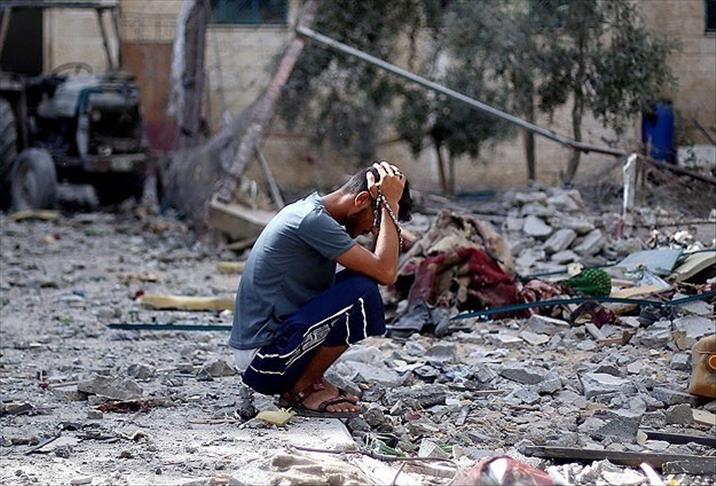
by A. Humeyra Atilgan
ISTANBUL
Turkish Jews are not Israelis and are not party to the Gaza conflict, a Middle East researcher has told Anadolu Agency, stressing the need to make a distinction between the two.
The question of Judaism equaling support for Israel has long confronted Jewish communities in other countries; the ongoing violence in Gaza from the Israeli military’s ‘Operation Protective Edge’ and rocket fire from Palestinian fighters has pushed this debate into prominence.
The extensive military operation by Israel, with the stated aim of halting rocket fire from Hamas, has resulted in hundreds of mostly civilian Palestinian casualties. Almost 30 Israeli soldiers and two civilians have died since the recent hostilities began on July 7.
Outside the region, the conflict has heightened feelings on both sides, spilling over into anti-Semitic violence last Sunday when a pro-Palestinian demonstration descended into attacks on Jewish shops in Sarcelles, outside Paris. The foreign ministers of Germany, France and Italy released a joint statement in Brussels on Tuesday condemning anti-Semitic outbursts at anti-Israeli demonstrations in Europe.
"The Jews of Turkey should not and could not be held responsible for any Israeli act, regardless of the Turkish standpoint towards it," says researcher Itamar Radai from the Dayan Center for Middle Eastern Studies at Tel Aviv University.
The Jewish people of Turkish origin have mixed feelings on the issue: "Here is the tragedy: Hamas says it will fight [against Israel] 'til death, while Israel says it will fight [against Hamas] until it has completely destroyed the Gaza tunnels," says Selim Amado, a Turkish Jew of Sephardic origin living in Tel Aviv.
"What happens in Israel and Gaza today also badly affects Turkish-Jewish friendship," he says, adding he prayed for both Jewish and Arabic Gazzan to get over the vicious cycle.
"Cruel" is how Turkish academic Nuh Arslantas, Associate Professor at Marmara University’s Faculty of Theology, describes the situation in Gaza today.
"Killing civilians in Palestine regardless of their sex or age, and bombarding mosques and hospitals is simply cruelty," he told Anadolu Agency (AA), and added, "it is devastating that all this happens in this holy month of Ramadan."
Israel says it is trying to destroy the infrastructure used by Hamas and other Palestinian organizations. It stepped up its offensive to include ground operations, sending thousands of troops into the embattled Palestinian territory to destroy tunnels.
On Sunday July 20, troops destroyed six tunnels that linked Gaza to the Israeli territory: “One of the tunnels found today [Sunday] was 1.2 km [0.75 miles] long, full of explosives, accessible from a house in Gaza, and which had an exit in Israel,” the military said on its official Twitter account.
"It was obvious that air attacks were inefficient in locating these tunnels and destroying them. The only choice was to send ground troops to Gaza to locate the tunnels and destroy them," says Professor Meir Litvak at the Department of Middle Eastern History at Tel Aviv University.
The presence of Hamas is a recurring theme for many. Dr. Avram Mizrahi, a Turkish Sephardic Jew living in Modi’in, Israel says: "The Israel army is targeting Hamas terrorists, who are hiding among civilians."
“I feel very sorry for the civilians killed, but the group which says it is fighting on behalf of Palestinians is in fact causing the deaths," Mizrahi said.
It is, however, argued that Israel has superior military air power, which is enough to prevent Hamas rockets from striking Israeli targets.
Turkish academic Arslantas believes that Israel is targeting Hamas-Fatah unity in Gaza, claiming Israel is opposed to such a deal.
"I think Israel, if it really wants, can achieve peace," he said.
Arslantas pointed to Egypt's proposed ceasefire between Gaza-based Palestinian factions and Israel last week, and said he found it “quite ridiculous”.
The proposal, initially accepted by Israel, was turned down by Hamas and Islamic Jihad, who say they were never consulted about the terms of the plan.
"How well can a government [Egypt], which blocked humanitarian aid to Gaza, support the rights of Palestinians," Arslantas asked, claiming that all such ceasefire efforts by Israel were just steps to “pretend that they tried for peace.”
Litvak said the Egyptian offer was the right track: "Fire should stop first then talks can start on economic relief to Gaza through Egypt and Israel, with a stipulation to prevent future clashes."
Israeli researcher Radai said it appears a ceasefire would only be possible through external mediation, since both sides have never negotiated directly. "Possible mediators might be actors from the region, who maintain relations with both sides," he added.
He pointed out that he did not expect much from the UN which he said "had proved itself futile in other situations".
Amado, a Sephardic Jew, called on the UN to force both sides to live together, ban the use of military weaponry and stop Israel from conducting military operations.
While the UN and the international community are blamed for not taking action to stop the chaos, pro-Palestinian demonstrators across the world gather to protest against Israel's ongoing operation.
Professor Litvak explains the demonstrations can be broken down into two distinct categories: "Some are held by organizations and people who are fundamentally opposed to anything Israel does, and even to its very existence."
“The other group is composed of people who are genuinely touched by the death of civilians."
Turkish academic Arslantas points to the difference between Israel and Judaism, and comments: "It cannot be accepted that Turkish Jews pay for Israel's bad policies.
“Similarly, it would be wrong to describe the anti-Israel protests as 'anti-Semitism'; they are two different things.”
He said the protests are against Israeli policies, not against the Jewish diaspora, claiming anti-Semitism is a serious offence and religiously forbidden.
Anadolu Agency website contains only a portion of the news stories offered to subscribers in the AA News Broadcasting System (HAS), and in summarized form. Please contact us for subscription options.

